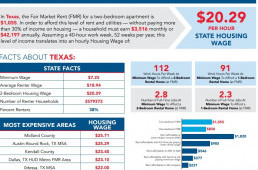
October 4, 2019 | by Katie Claflin
Categories: Affordable Housing, Rental Housing
Every year the National Low Income Housing Coalition releases its annual ‘Out of Reach’ report comparing rental housing prices with hourly wages of renters.
The most recent numbers for Texas are alarming. According to the 2019 report, the fair market rent (FMR) for a two-bedroom apartment in Texas is now $1,055. This is 5% higher than the FMR in 2018 ($1,005) and 10% higher than the FMR in 2017 ($956).
Furthermore, wages are not keeping pace with rent increases. The average renter hourly wage in 2019 is $18.94, compared with $18.20 in 2018 and $17.89 in 2017. This means the average renter wage only increased 4% from 2018 to 2019 and 6% from 2017 to 2019, far slower than the increases in FMR.
The 'Out of Reach' report also calculates what a household should earn to reasonably afford a two-bedroom apartment in Texas, without having to work overtime or sacrifice other necessities to afford housing. This is called the “Housing Wage.” Households earning a Housing Wage do not have to spend more than 30% of their annual income on rent (a general rule of thumb for affordability).
The 2019 Housing Wage for Texas is $20.29, a full $1.35 per hour more than the actual average renter’s wage of $18.94. The Housing Wage of $20.29 per hour equates to $3,516 per month (assuming a 40-hour work week), or $42,197 per year.
Here’s the 2019 Housing Wage for the largest metro areas in Texas. Of the five largest metro areas in Texas, only Houston currently has an average renter wage higher than the Housing Wage.
The $20.29 state Housing Wage is particularly problematic for minimum wage (currently $7.25 per hour) workers. Minimum wage workers logging 40 hours per week can only afford $377/month in rent before becoming cost burdened by housing expenses or being forced to work additional hours.
In fact, workers earning the minimum wage must work 2.8 full time jobs to afford the FMR for a two-bedroom apartment ($1,055) or 2.3 full time jobs to afford the FMR of a one-bedroom apartment ($858). That equates to working 112 hours per week to afford a two-bedroom apartment and 91 hours per week to afford a one-bedroom apartment.
Want to see affordability statistics for minimum wage and average wage workers in your area? We encourage you to view the full 2019 'Out of Reach' report, which includes statistics for each metro area and county in Texas.
On the House blog posts are meant to provide general information on various housing-related issues, research and programs. We are not liable for any errors or inaccuracies in the information provided by blog sources. Furthermore, this blog is not legal advice and should not be used as a substitute for legal advice from a licensed professional attorney.
TSAHC reviews all blog comments before they are posted to ensure a positive experience for our online community. Off-topic comments; hostile, derogatory or deliberately insulting comments; and comments specifically promoting goods and services will not be posted.
Approved comments will be published in their entirety. Personal information will not be removed unless it pertains to someone other than the person submitting the comment. For more information, please see our Comment Posting Guidelines.
To remove a previously submitted and published comment, please contact Anna Orendain at [email protected].
If you have a question regarding any of TSAHC's programs, please contact us.

It was never intended for minimum wage jobs to be enough to allow those earners to rent apartments on their own. Minimum wage jobs were stepping stone jobs as people were going to school and working their way into better paying jobs. We either had roommates or lived with family while earning minimum wage. While I do agree rents and prices on housing and everything else have risen considerably, I don’t think raising the minimum wage is necessarily the entire answer. We need to increase training programs in high schools. It use to be an 18 year old could graduate and get into an entry level position and work their way up and although things were tight, they could move on their own. Now employers either want degrees or experience and in many cases both.